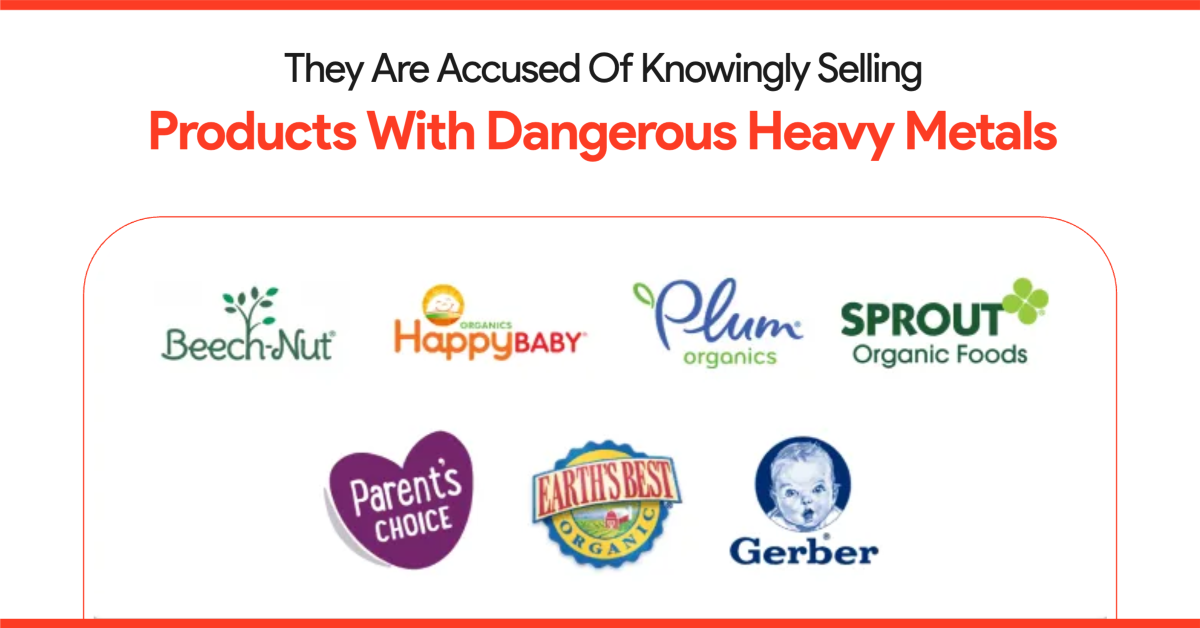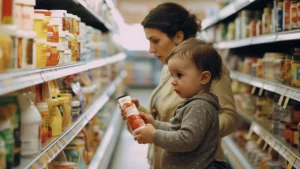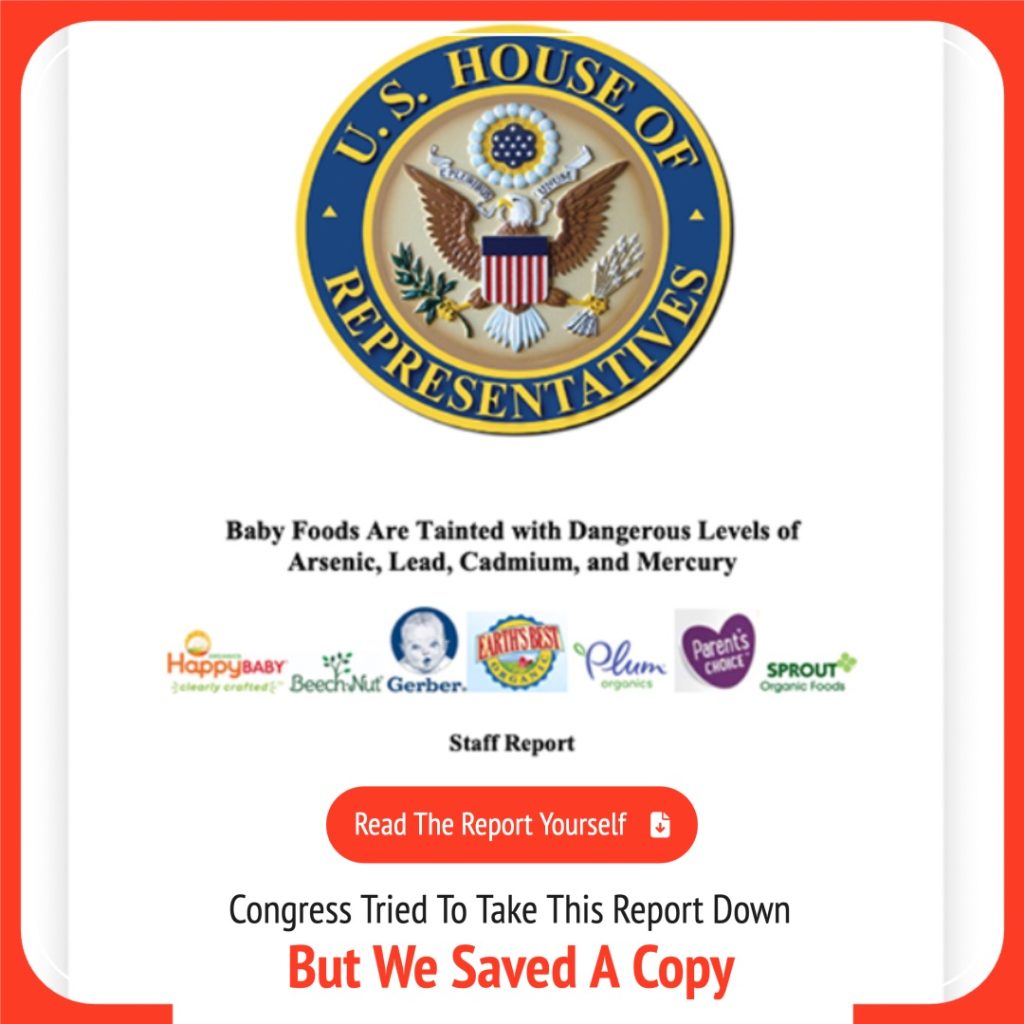Childhood exposure to heavy metals can cause damage to neurological development

Baby Food exposure To Toxic Heavy Metals
Baby food products were produced for infants and children as young as four months old that contained toxic heavy metals. Contaminated baby foods have been the subject of lawsuits alleging that these products contain dangerous levels of toxic heavy metals such as lead, arsenic, and mercury, which are believed to have caused neurodevelopmental disorders including autism and related conditions in children who consumed these tainted products. Children are vulnerable to damaging neurological effects from heavy metals, including:

According to both the Food and Drug Administration and World Health Organization, heavy metals are dangerous to health. Even low level exposure to heavy metals in baby food can cause serious and often irreversible damage to the brain development of infants. This can also lead to negative effects on long-term brain function.
What is happenning with the Toxic baby food?
Investigation by the U.S. House into Baby Food Reveals Toxic Metals
Lawyers from Scranton Law Firm represent hundreds of children suffering from autism spectrum disorder (ASD) and attention-deficit/hyperactivity disorder after being exposed to dangerously high levels of heavy metals in baby food products.
Attorneys filed the first toxic baby food lawsuit in California and possibly the nation against several baby food companies alleging they knowingly sell products tainted with arsenic, lead, cadmium, and mercury. We represent parents, who allege their seven-year-old son, suffers from neurodevelopmental disorders after consuming substantial quantities of baby foods from the following baby food manufacturers:
- Gerber
- Earth’s Best Organic (Hain Celestial Group)
- Beech-Nut (Beech-Nut Nutrition Company)
- HappyBABY (Nurture, Inc.)
- Plum Organics (Campbell Soup Company)
- Parent’s Choice (Walmart private brand)
- Sprout Organic Foods (Sprout Foods, Inc.)
These companies are accused of knowingly selling products contaminated with dangerous levels of toxic metals. The legal action centers around the case of a seven-year-old child who, after consuming significant amounts of baby food from these manufacturers, has been diagnosed with neurodevelopmental disorders.
This litigation aims to hold these corporations accountable for their negligence and to secure compensation for affected families to cover healthcare costs, ongoing therapy, and other damages. The broader goal is to force these manufacturers to remove harmful contaminants from their products to ensure they are safe for all children.

Find out if your child qualifies
Get a confidential case evaluation
Scranton Law Firm is in active litigation against the baby food companies listed above and intends to go to trial in 2023. To see if your child qualifies for a baby food lawsuit, fill out our confidential case evaluation form or call our legal team at (800) 400-8742 to schedule an appointment with a lawyer who can answer all your questions.
Join the Baby Food Heavy Metals Lawsuit – Justice for Children with Neurodevelopmental Disorders
In 2021, a U.S. Congressional Subcommittee reported that numerous popular baby food products, including infant rice cereal, teething biscuits, purees, rice cakes, and others, contain “dangerously high levels” of arsenic, mercury, lead, and cadmium. Shockingly, Happy Family Organics, Gerber, Hain Celestial (Earth’s Best Organic), Beech-Nut, Plum Organics, Walmart (Parent’s Choice), and Sprout Organic Food knowingly sold tainted baby food to unsuspecting parents, according to the report.
Numerous studies have linked toxic heavy metal exposure to behavioral impairments. The link is especially pronounced among babies and young children, whose brains are still developing. Even at low levels, exposure to heavy metals can cause severe and irreversible damage to neurological development in children. As one recent study observed:

Tell Us About Your Case
What Are Toxic Heavy Metals?
In 2021, a U.S. Congressional Subcommittee reported that numerous popular baby food products, including infant rice cereal, teething biscuits, purees, rice cakes, and others, contain “dangerously high levels” of arsenic, mercury, lead, and cadmium. Shockingly, Happy Family Organics, Gerber, Hain Celestial (Earth’s Best Organic), Beech-Nut, Plum Organics, Walmart (Parent’s Choice), and Sprout Organic Food knowingly sold tainted baby food to unsuspecting parents, according to the report.
Heavy Metals Side Effects
Arsenic: Linked to bladder and lung cancer; damage to the central nervous system, brain development, and cognitive development; immunological effects; IQ deficit (specifically verbal, performance and memory); ASD; decrease in global motor, gross motor, and fine motor.
Cadmium: Linked to decreases in IQ; development of ASD and ADHD.
Lead: Linked to behavioral problems; ASD; decreased cognitive performance; delayed puberty; reduced postnatal growth; damage to central nervous system and brain development; adverse effect on academic achievement; with lower reading and math scores; significant association with ADHD.
Mercury: Linked to adverse subsequent neuro-development; ASD; poorer estimated IQ; positively associated with autistic behaviors among preschool children.
Heavy Metals Side Effects
Public health agencies and medical professional organizations agree that exposure to toxic heavy metals is particularly dangerous for young children:
Heavy metals pose a “major public health concern” for children. –World Health Organization (WHO)
Heavy metals “may build up in biological systems and become a significant health hazard.” Noticeable consequences of exposure could be delayed for years. –Occupational Safety and Health Administration (OSHA)
Arsenic is number one among environmental substances that pose the most significant potential threat to human health, followed by lead (second), mercury (third), and cadmium (seventh). –Agency for Toxic Substances and Disease Registry (ATSDR)
No level of exposure to these heavy metals has been shown to be safe in children. –American Academy of Pediatrics
Findings
The U.S. House Oversight and Reform Subcommittee on Economic and Consumer Policy has issued multiple shocking reports on heavy metals in baby food. In February of 2021, the Subcommittee’s report ‘Baby Foods Are Tainted with Dangerous Levels of Arsenic, Lead, Cadmium, and Mercury’ detailed staggering levels of toxic metals in baby foods.
According to the February 2021 report, Nurture (Happy Family Organics and HappyBABY), Beech-Nut, Hain Celestial Group (Earth’s Best Organic), Plum Organics, Walmart (Parent’s Choice), Sprout Foods, and Gerber knowingly sell baby foods containing as much as 180 parts per billion (ppb) inorganic arsenic, 6441 ppb lead, 10 ppb mercury, and manufacture their products using ingredients containing as much as 913.4 ppb arsenic, 886.9 ppb lead, and 344.55 ppb cadmium, far eclipsing domestic and international regulatory standards.
To put this in perspective, here are the maximum allowable limits that the U.S. Food and Drug Administration (FDA) and the U.S. Environmental Protection Agency (EPA) set for arsenic, cadmium, lead, and mercury are:
The FDA allows a maximum level of 5 parts per billion (ppb) lead in bottled water.
The government report found 177 times more than the acceptable level of lead in baby food products.
The FDA allows a maximum level of 10 ppb arsenic in bottled water.
The government report found 91 times more than the acceptable level of arsenic in baby food products.
The FDA allows a maximum level of 5 ppb cadmium in bottled water.
The government report found 69 times more than the acceptable level of cadmium in baby food products.
The EPA allows a maximum of 2 ppb mercury in drinking water.
The government report found 5 times more than the acceptable level of mercury in baby food products.
Toxic Baby Food Lawsuit News and Updates

Could RFK Jr.’s Nomination Be A Game-Changer for Toxic Baby Food Lawsuits
Could RFK Jr.’s Nomination Be A Game-Changer for Toxic Baby Food Lawsuits take our free case quiz RFK Jr.’s Nomination as HHS Secretary: Implications for

What a Causation Hearing Means for Families Impacted by Toxic Baby Food
What a Causation Hearing Means for Families Impacted by Toxic Baby Food take our free case quiz Understanding the pivotal role of causation hearings in

Toxic Baby Food Lawsuit Update: January 31, 2024
Toxic Baby Food Lawsuit Update: January 31, 2024 take our free case quiz Latest Updates On The Toxic Baby Food Lawsuit -Jan 31 2024 In

California’s New Law on Baby Food Safety: A Comprehensive Overview
California’s New Law on Baby Food Safety: A Comprehensive Overview take our free case quiz Understanding California’s New Law On To Protect Children From Heavy

Toxic Heavy Metals In Kids Beverages A Rising Autism Risk
Toxic Heavy Metals In Kids Beverages A Rising Autism Risk by Christian Scranton take our free case quiz Today, I want to shed light on

The Implications of FDA’s New Lead Levels in Baby Food: Time for Accountability
The Implications of FDA’s New Lead Levels in Baby Food: Time for Accountability Toxic Baby Food Lawsuit Update take our free case quiz January 27,

Toxic Baby Food Lawsuit Updates
The legal landscape surrounding toxic metals in baby food continues to evolve rapidly. Here’s a recap of key developments from the past months:
September 2025 UpdatesEmpty heading
Empty heading
Empty heading
Texas AG Launches Baby Food Probe (Sept. 1, 2025)Empty heading
Texas Attorney General Ken Paxton is investigating Gerber and Plum Organics for allegedly selling baby food with toxic metals. Subpoenas issued on Aug. 26 seek internal safety data and marketing records. The probe adds regulatory pressure and may help expose internal documents relevant to the MDL.
August 2025 UpdatesEmpty heading
Empty headingNew California Lawsuit Filed (Aug. 30, 2025)Empty heading
A California family has joined the MDL, claiming their child developed autism and ADHD from consuming baby foods contaminated with arsenic, lead, cadmium, and mercury. The lawsuit adopts all claims in the MDL’s master complaint.
General Causation Discovery Ends (Aug. 29, 2025)Empty heading
Discovery on whether toxic metals in baby food cause ASD/ADHD is now closed. The MDL moves into Daubert hearings, with the first set for Dec. 8. A win for plaintiffs could trigger bellwether trials and settlement pressure.
Plaintiffs Press Narrow Framing (Aug. 20, 2025)Empty heading
Debate continues over how to frame the scientific question. Plaintiffs want the focus solely on toxic metals; defendants argue the court should evaluate baby food as a whole. The court’s choice may shape which expert evidence is allowed.
July 2025 UpdatesEmpty heading
Empty heading
Walmart Named in More Cases (July 18, 2025)Empty heading
Walmart is facing more lawsuits over its Parent’s Choice baby food brand, which holds about 30% of the U.S. market.
Indiana Family Joins MDL (July 7, 2025)Empty heading
An Indianapolis family alleges their son developed autism from exposure to toxic metals in baby foods consumed in 2007–2008. The case names Gerber, Beech-Nut, Plum, and Nurture.
MDL Hits 180 Cases (July 3, 2025)Empty heading
The MDL now includes 180 active cases. While growth appears steady, attorneys are watching expert rulings before filing additional lawsuits.
June 2025 UpdatesEmpty heading
MDL Adds 11 New Cases (June 1, 2025)Empty heading
The toxic baby food MDL saw 11 new lawsuits filed in May, bringing the total number of pending cases to 167. While this growth may appear modest, legal experts caution that the numbers don’t reflect the full scale of the litigation.
Because most states pause the statute of limitations for children until they reach adulthood, attorneys are not under immediate pressure to file. Many are holding off while they monitor how the case develops during early discovery and expert testimony. As the litigation progresses, the volume of new filings is expected to rise.
May 2025 Updates
CDC Report Highlights Lead Exposure Crisis (May 23, 2025)
A new CDC report has raised serious concerns about lead exposure in young children, calling it a “significant public health concern.” The findings reveal that over 6.4% of U.S. children under age six—an estimated 1.5 million—have detectable blood lead levels. Black children were nearly twice as likely as white children to have elevated levels, underscoring a racial disparity in exposure.
For plaintiffs in the baby food MDL, this report provides crucial federal evidence that supports claims of harm. It helps establish that lead exposure is both widespread and dangerous, especially for developing brains. The CDC’s findings may also increase pressure on manufacturers and strengthen arguments for punitive damages.
April 2025 Updates
Target Baby Food Recall Linked to Lead (April 17, 2025)Empty heading
Over 25,000 containers of Good & Gather baby food sold exclusively at Target were recalled due to elevated lead levels. The affected products—pea, zucchini, kale, and thyme puree—were manufactured by Fruselva USA and included specific lot numbers with “Best by” dates in December 2025.
While the FDA classified the recall as Class II (moderate risk), health experts warn that any lead exposure in children can be harmful. Plaintiffs in the baby food MDL cite this recall as further evidence that manufacturers failed to properly test and warn consumers.
New Lawsuit Filed by Colorado Family (April 11, 2025)Empty heading
A family from Denver, Colorado filed a new lawsuit against Gerber and Walmart, alleging their child developed autism after consuming baby food tainted with toxic metals. The child, referred to as I.F., was fed Gerber and Walmart’s Parents’ Choice products during infancy and later diagnosed with autism spectrum disorder.
The lawsuit claims the products were contaminated with lead, arsenic, mercury, cadmium, and aluminum—metals known to cause neurological harm. The family accuses the companies of failing to warn parents and selling dangerous products marketed as healthy. The suit seeks compensation for medical expenses, pain and suffering, and punitive damages.
February 2025 Updates
MDL Case Growth Slows with Only 4 New Cases (February 5, 2025)
The toxic baby food MDL saw only four new cases filed in January, a significant drop from the 12 cases added in December. This brings the total number of pending cases to 92.
While filings have slowed, legal experts anticipate that the June 2025 trial could trigger a surge in new lawsuits if the plaintiff secures a favorable verdict. For now, the pace of new case filings remains uncertain.
January 2025 Updates
New Lawsuit Filed in MDL (January 20, 2025)
A new lawsuit has been filed in the toxic baby food MDL on behalf of a family in Indianapolis, Indiana. The case alleges that their child, diagnosed with autism, suffered neurodevelopmental harm after consuming baby foods contaminated with toxic heavy metals.
The complaint states that between 2019 and 2021, the child regularly ate products from Gerber, Plum, and Walmart, which allegedly contained lead, arsenic, mercury, and cadmium—substances known to harm early brain development.
The parents claim they were unaware of these contaminants and were not warned about the risks. The lawsuit argues that the manufacturers failed to take adequate safety measures to minimize heavy metal exposure or provide warnings that would have allowed parents to make informed choices. The child’s autism diagnosis, made two years ago, is directly attributed to these contaminated products.
Heavy Metal Toxicity in Toddlers – Key Arguments in Litigation (January 10, 2025)
Heavy metal toxicity in toddlers is primarily caused by exposure to lead, arsenic, cadmium, and mercury in their environment and diet. A major source of exposure is baby food, particularly rice-based products like infant rice cereal, teething biscuits, and rice puffs, which absorb metals from contaminated soil and water.
Other environmental sources include lead-based paint, contaminated drinking water (from old pipes), and household dust. In the ongoing litigation, defendants are expected to argue that these environmental factors—not baby food—are the primary cause of metal exposure in children.
To counter this defense, plaintiffs’ attorneys must prove that baby food was a substantial contributing factor to the child’s exposure, even if it was not the only source. This requires:
Evidence linking specific Gerber, Beech-Nut, or Plum Organics products to heavy metal exposure in affected children.
Expert testimony proving that the levels of metals in baby food were high enough to cause neurodevelopmental harm.
Ruling out other sources as the sole explanation for a child’s exposure.
These causation arguments will be critical in determining the success of the lawsuits. Parents concerned about exposure are advised to avoid rice-based products, choose brands that test for heavy metals, and minimize environmental risks.
FDA Sets Maximum Lead Levels in Baby Food (January 6, 2025)
The FDA has issued new guidelines establishing maximum lead levels in baby foods to reduce early childhood exposure to toxic heavy metals. The new “Closer to Zero” initiative sets the following limits:
10 parts per billion (ppb) for processed baby foods made from fruits, vegetables, grains, meats, yogurts, and custards.
20 ppb for single-ingredient root vegetables and dry infant cereals.
While these guidelines are not legally binding, they provide a benchmark that the FDA may use for enforcement actions against manufacturers. These new limits are expected to play a role in ongoing litigation, as they highlight the industry’s need to reduce heavy metal contamination.
MDL Grows to 88 Cases, Trial Postponed to June (January 3, 2025)
The toxic baby food MDL continues to expand, with 12 new cases added in early January, bringing the total case count to 88.
Many were anticipating the first state court trial this month, but it has now been postponed until June 2025. The outcome of this trial will be closely watched, as a plaintiff victory could significantly increase the number of lawsuits filed nationwide.
December 2024 Updates
Judge Rules on Walmart Discovery Issue (December 31, 2024)
A key ruling was issued regarding Walmart’s role in the discovery process for the toxic baby food MDL. Plaintiffs had pushed aggressively to prevent Walmart and its attorneys from communicating with co-manufacturers about subpoenas issued by plaintiffs. However, Judge Corley rejected this request, allowing Walmart to continue discussions with its co-manufacturers.
The judge did, however, require Walmart to facilitate meetings between co-manufacturers and plaintiffs’ counsel before responding to subpoenas. This ensures transparency while still allowing Walmart to engage with its suppliers.
Baby Food Manufacturers Move to Dismiss MDL Cases (December 3, 2024)
Defendants in the toxic baby food MDL have filed a motion to dismiss all claims, arguing that:
The lawsuits lack solid scientific evidence linking heavy metal exposure in baby food to autism.
Heavy metals are naturally occurring and unavoidable in food products.
Plaintiffs have not proven negligence or wrongdoing by the companies.
Federal law (via the FDA) should preempt state-level lawsuits to ensure uniform regulations.
Despite these arguments, legal experts consider this motion unlikely to succeed. Plaintiffs counter that manufacturers failed to take reasonable steps to reduce contamination or warn parents about risks. Additionally, the claim that FDA oversight should prevent litigation is weak, as regulatory standards do not automatically shield companies from liability.
While causation will be debated, emerging research suggests a connection between heavy metals and neurodevelopmental disorders like autism and ADHD. Courts typically allow such cases to move forward so that expert witnesses and scientific evidence can be fully examined.
MDL Case Count Rises Sharply (December 2, 2024)
The toxic baby food MDL added 23 new cases in November, marking a 44% increase from the previous month. The total number of lawsuits now stands at 75.
If the upcoming California state trial in January results in a verdict favoring the plaintiff, more claims will likely follow. However, this won’t immediately translate into a wave of new lawsuits, as families often take time to decide whether to pursue legal action.
Empty heading
November 2024 Updates
Status Conference Sets New Deadlines (November 13, 2024)
New deadlines were set during a recent status conference for the toxic baby food MDL. Key dates include:
- February 6, 2025: Briefing deadline for Rule 12(b) motions, which allow defendants to request case dismissal based on legal deficiencies.
- February 27, 2025: Hearing for Rule 12(b) motions.
- April 2025: Start of expert discovery for general causation.
- December 8, 2025: Hearing for general causation.
Other developments include a protective order for Nurture’s document production, due November 14, 2024. Plaintiffs can now issue subpoenas to Walmart’s suppliers and co-manufacturers while preserving purchase records.
Additionally, a short-form complaint will be finalized after the Rule 12(b) ruling, and a Plaintiff Fact Sheet is expected by year-end. Monthly case management conferences will begin on December 12, 2024.
California Trial Set for January 2025 (November 7, 2024)
The first baby food heavy metals trial is set for January 21, 2025, in California state court. This case will proceed ahead of the MDL and serve as the first opportunity to present claims to a jury.
At the center of the trial is whether manufacturers like Gerber and Beech-Nut were aware of harmful metals in their products and failed to warn consumers. The outcome will provide an early look at how juries might respond to these claims.
MDL Case Count Nearly Doubles (November 1, 2024)
The number of cases in the toxic baby food MDL rose from 32 to 52 in October, adding 20 new lawsuits.
While there’s no immediate rush to file claims for minors due to extended statute of limitations in most states, variations in state rules complicate the process. For example, some states allow lawsuits years after the child turns 18, while others have stricter deadlines. Statute of repose laws, which set hard deadlines regardless of discovery, further add complexity.
Given these differences, filing early is often the safest option to avoid legal challenges related to timing.
October 2024 Updates
Rice and Heavy Metal Contamination (October 27, 2024)
Rice, a common ingredient in baby food, is under scrutiny for absorbing harmful metals like arsenic and cadmium. These metals are more likely to be found in rice grown in flooded fields, where water helps mobilize arsenic from soil into plants.
Studies have linked inorganic arsenic, a carcinogen, to neurodevelopmental delays and reduced cognitive function in children. Despite these risks, lawsuits allege that manufacturers failed to adopt stricter testing and safety measures.
Understanding the Statute of Limitations (October 15, 2024)
In most states, the statute of limitations for toxic baby food cases is paused for minors until they reach 18 years of age, allowing extra time to file claims. However, some states, like Florida, impose stricter timelines for filing.
Other rules, such as the discovery rule, can extend filing deadlines if harm is discovered later. The complexity of these laws underscores the importance of filing lawsuits early to avoid potential time-bar challenges.
Loyalty Programs as Evidence (October 13, 2024)
Loyalty programs offered by baby food companies are emerging as critical evidence in these lawsuits. These programs track purchase histories through linked accounts, receipts, or rewards systems, which can provide proof of which products families used.
If you’re part of a loyalty program, retain all relevant documentation, including purchase records, rewards earned, and redemption details. This information can support claims in product liability cases and help accurately document your lawsuit.
MDL Adds Two New Cases (October 1, 2024)
The toxic baby food MDL added two new cases in September, bringing the total back to 32 after a slight drop in August.
Many attorneys are waiting to see how this litigation progresses before filing additional lawsuits. Unless an upcoming statute of limitations requires immediate action, delaying may provide strategic benefits.
September 2024 Updates
Texas Case to Stay in State Court (September 11, 2024)
The 5th Circuit Court ruled that a toxic baby food lawsuit against Hain Celestial Group and Whole Foods will remain in Texas state court.
The lawsuit alleges that harmful metals in baby food caused a toddler’s physical and mental decline. Initially moved to federal court, the case was sent back to state court due to clarified claims of negligence and breach of warranty against Whole Foods. This decision reinforces the importance of properly asserting claims in these cases.
Addressing Metals in Baby Food Staples (September 10, 2024)
A study from the University of Delaware highlights how heavy metals like arsenic and cadmium end up in baby food staples such as rice and spinach.
Rice grown in flooded fields absorbs more arsenic, while drier conditions increase cadmium levels. The study suggests manufacturers have done little to mitigate these risks, leaving plaintiffs arguing for stricter testing and sourcing standards to protect children.
MDL Case Count Drops Slightly (September 3, 2024)
The toxic baby food MDL saw a small decrease in pending cases, dropping from 31 to 30 last month.
New cases continue to trickle in, but many attorneys are adopting a wait-and-see approach. Filing early remains critical for families with approaching statutes of limitations, while others are waiting for more clarity as the litigation develops.
August 2024 Updates
Court Orders Evidence Disclosure (August 24, 2024)
Key decisions were made during a status conference in the MDL, including requirements for defendants to produce:
- Test results for heavy metals in baby food and water used during manufacturing (2012–2021).
- Information about third-party co-manufacturers and suppliers from the same period.
Defendants must also file evidence preservation details by September 12, 2024, and submit an ESI (electronically stored information) protocol by September 19, 2024.
New Florida Lawsuit Filed (August 22, 2024)
A Florida family filed a lawsuit against major baby food companies in the MDL, claiming their child developed Autism Spectrum Disorder due to exposure to toxic metals in baby food.
The lawsuit alleges that these companies knowingly sold products contaminated with harmful metals like arsenic, lead, and mercury while failing to warn consumers. The family seeks damages for the significant harm caused.
July 2024 Updates
Lawyers File Master Complaint Against Baby Food Companies (July 22, 2024)
A major legal step was taken in the baby food lawsuits. A master complaint, representing numerous families, was filed against baby food companies like Beech-Nut, Gerber, and Walmart in an MDL. The complaint accuses these companies of selling baby food contaminated with harmful metals like lead and arsenic.
Families claim these metals caused their children to develop conditions like autism and ADHD. They also say the companies knew about the risks but didn’t warn anyone. The complaint details how the companies allegedly contributed to the contamination and hid the dangers from consumers.
The families are seeking financial compensation for the harm done to their children.
Florida Family Directly Files Baby Food Lawsuit (July 19, 2024)
A family from Orlando, Florida has taken advantage of a new, faster legal process to file a lawsuit against Gerber, Beech-Nut, and Walmart. They claim their child developed autism due to toxic heavy metals like lead, arsenic, and mercury found in baby food products. This direct filing method allows families to bypass potential delays in the legal system.
Filing Baby Food Lawsuits: A Faster Option (July 3, 2024)
Families can now file their baby food lawsuits directly with the court handling all similar cases, avoiding delays caused by transferring cases. This new process aims to speed up legal action for claims related to health issues caused by toxic metals in baby food, such as autism or ADHD.
To file directly, you need to start a new case without the existing case number and pay the usual fee. You’ll also need to fill out a form indicating where your case would have been filed originally.
Please note that each lawsuit must be filed individually, unless it involves multiple plaintiffs from the same household or related claims. While major companies can be served via email, others will need traditional service methods.
Slow Start Expected in Baby Food Lawsuits (July 2, 2024)
The number of baby food lawsuits increased slightly last month with two new cases added. However, the overall pace is expected to be slow initially. This is because there’s no immediate pressure to file these types of lawsuits since most states allow ample time for claims made on behalf of children.
June 2024 Updates
Key Dates Set for Baby Food Lawsuits (June 29, 2024)
In an effort to simplify the legal process, all parties involved in the baby food lawsuits have agreed on a schedule for creating a Master Complaint. This document will combine the common claims of all families suing baby food companies into one comprehensive document. This will help the court understand the main issues and speed up the legal process.
In the ongoing legal cases regarding baby food safety, the involved parties have agreed on a timeline for important legal documents:
- July 15, 2024: The deadline for a combined complaint, known as a Master Complaint, to be submitted. This document will summarize the common claims and concerns of all the families involved in the lawsuits.
- September 16, 2024: The deadline for the companies being sued to respond and potentially ask for the case to be dismissed.
- October 28, 2024: The deadline for the families to respond to any requests for dismissal made by the companies.
- November 18, 2024: The final deadline for any additional responses or arguments from the companies.
This timeline is crucial for organizing and progressing the numerous lawsuits, ensuring a fair and efficient legal process for all involved parties.
New Lawsuit Filed in Indiana (June 11, 2024): A lawsuit was filed in Indiana on behalf of a child diagnosed with autism spectrum disorder, alleging that exposure to toxic heavy metals in baby food contributed to their condition. The lawsuit targets major manufacturers and sellers like Gerber, Beech-Nut, Walmart, Nurture, and Danone.
Motion to Join Baby Food MDL (June 5, 2024): In the case D.J. v. Gerber Products Co. et al., plaintiffs’ lawyers filed a motion to include their case in the Baby Food Multidistrict Litigation (MDL). This move seeks to consolidate similar lawsuits alleging brain injuries resulting from toxic metals in baby food.
No New Cases Added to MDL in May (June 3, 2024): While five cases were added to the MDL in April, no new cases were added in May, keeping the total at 25.
May 2024 Updates
New Baby Food Lawsuit Filed in Texas (May 30, 2024): A Texas plaintiff diagnosed with autism filed a lawsuit against Beech-Nut and Gerber, alleging their baby food products caused brain injury due to heavy metal contamination.
Study Links Fluoride to Neurological Damage (May 22, 2024): A new study published in JAMA suggests a potential link between prenatal fluoride exposure and neurobehavioral problems in children. However, this does not undermine the existing lawsuits focused on heavy metals in baby food.
Customer Loyalty Records as Evidence (May 20, 2024): Information from retailer customer loyalty programs could be valuable evidence for plaintiffs in proving their purchase history of specific baby food brands and products.
First MDL Status Conference (May 16, 2024): The first status conference for the toxic baby food MDL was held, addressing initial pretrial proceedings and potential leadership appointments.
New Legislation Proposed (May 14, 2024): The Baby Food Safety Act of 2024 has been introduced in Congress, aiming to strengthen regulations on toxic metals in baby food and enhance the FDA’s authority in this area.
April 2024 Updates
New Lawsuits Filed in Illinois and Nevada (May 3 and April 17, 2024): Additional lawsuits have been filed in Illinois and Nevada, alleging brain injuries and autism spectrum disorder in children caused by exposure to heavy metals in baby food.
March 2024 Updates
March 2024: Pivotal Hearing in Baby Food Lawsuits
A significant development is anticipated in the ongoing legal battles surrounding baby food safety. On March 28th, a panel of federal judges will convene to determine whether numerous lawsuits alleging harm caused by baby food should be consolidated into a single multidistrict litigation (MDL). This meeting marks the second time the U.S. Judicial Panel on Multidistrict Litigation (JPML) has addressed this issue, underscoring the gravity and continued concern regarding these cases. We will closely monitor this hearing and provide updates on any decisions made, as they could have far-reaching implications for both families and companies involved in this litigation.
February 2024 Updates
February 2024: Legal Maneuvers and Regulatory Push in Baby Food Cases
The year commenced with a strategic move by attorneys handling baby food lawsuits, who filed a motion to consolidate several cases into an MDL. This approach streamlines pretrial proceedings by grouping similar lawsuits together, enhancing efficiency while preserving the individual nature of each case.
Simultaneously, state attorneys general intensified their calls for the FDA to enact stricter regulations on testing for heavy metals in baby food. This push was prompted by recent lead poisoning incidents linked to applesauce pouches, underscoring the urgency for more comprehensive safety measures.
January 2024 Updates
January 2024: Progress in Litigation and Appellate Court Victory
The legal firm Wisner Baum announced plans to advance a baby food lawsuit trial, with the potential for a consolidated trial as early as summer 2024. Although not the first trial of its kind, this case represents a significant step in their legal strategy.
In a separate development, the Second Circuit Court of Appeals overturned the dismissal of consumer claims against Beech-Nut Nutrition Company. The court criticized the deference given to the FDA’s delayed “Closer to Zero” action plan and ruled that the litigation should proceed. This decision could have broader implications for future baby food lawsuits.
Book A Call With An Expert Now
For Free!
Have a Question?
Toxic Baby Food Lawsuit FAQ's
If you don’t find the answer to your questions here please give us a call to discuss your child
The lawsuits allege that certain baby food products contain dangerous levels of toxic heavy metals (lead, arsenic, mercury), which can cause developmental and neurological issues in infants and children.
Several major baby food manufacturers and retailers are named, including Gerber, Beech-Nut, Walmart, Nurture, and Danone.
Plaintiffs claim various injuries, primarily neurological disorders like autism spectrum disorder (ASD) and attention deficit hyperactivity disorder (ADHD), as well as developmental delays and cognitive impairments.
An MDL consolidates multiple similar lawsuits for pretrial proceedings to streamline the process and potentially lead to a global settlement or series of bellwether trials. This is relevant as it could centralize the handling of numerous baby food lawsuits.
The lawsuits are in early stages, with some cases filed and motions made for MDL consolidation. Legal and regulatory developments are ongoing, including the proposed Baby Food Safety Act of 2024.
Yes, you may still be able to file if your child has a neurological disorder or injury after consuming baby food containing heavy metals. Consult an attorney specializing in these cases to discuss your options.
The Scranton Law firm is doing its best to keep toxic baby food lawsuit updates posted to this page as soon as we hear anything
No, there is no evidence suggesting intentional addition of heavy metals. However, lawsuits allege companies knew or should have known about contamination and failed to address it adequately.
While some heavy metals occur naturally, levels found in some baby food exceed safe limits, suggesting contamination during manufacturing, packaging, or from high-contamination ingredient sources.
Consult your pediatrician if you’re concerned about heavy metal exposure. They can assess your child’s risk and recommend any necessary testing or monitoring.
Finding food entirely free of heavy metals is challenging due to their natural presence. However, some brands prioritize sourcing and testing to minimize heavy metal content.
A successful lawsuit may provide financial compensation but cannot undo any existing harm. The primary goal is to hold companies accountable and promote safer industry practices.
Yes, lawsuits may target any brand whose products contain unsafe levels of heavy metals, regardless of size or organic claims.
Yes, there may be delayed or subtle health effects not immediately apparent. Ongoing research and monitoring of exposed children are crucial to understand long-term consequences.
Parents can choose brands with stricter testing and sourcing practices, offer a varied diet, and consult their pediatrician about testing options.
Yes, retailers may also face legal action for their role in selling contaminated products, as they have a responsibility to ensure product safety.
Yes, similar lawsuits and regulatory efforts are underway in various countries, reflecting a growing global concern about heavy metals in baby food.
The FDA has initiated the “Closer to Zero” plan to address heavy metals, but its implementation has faced delays. Lawsuits and advocacy groups are pushing for stricter and faster action.
They can contact their representatives, support relevant legislation like the Baby Food Safety Act, and raise awareness about the issue through various platforms.
